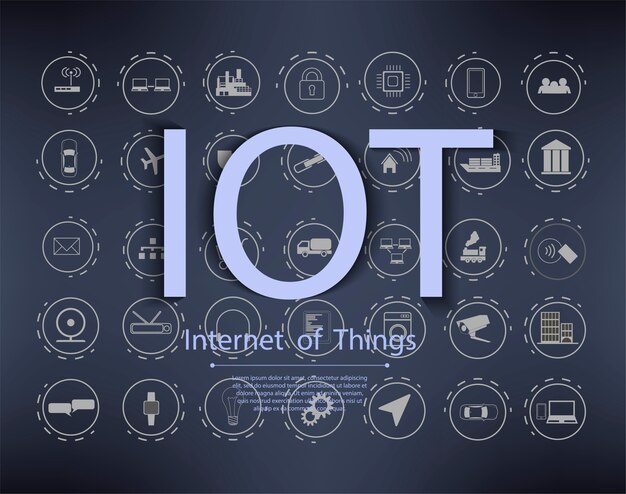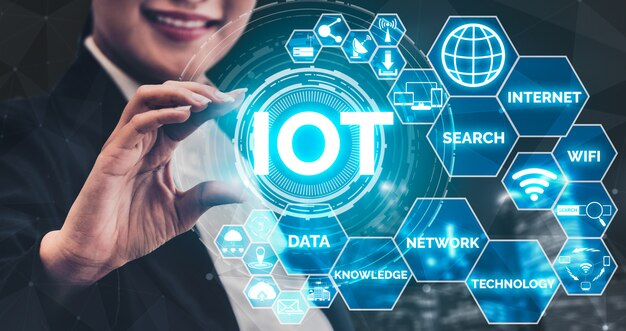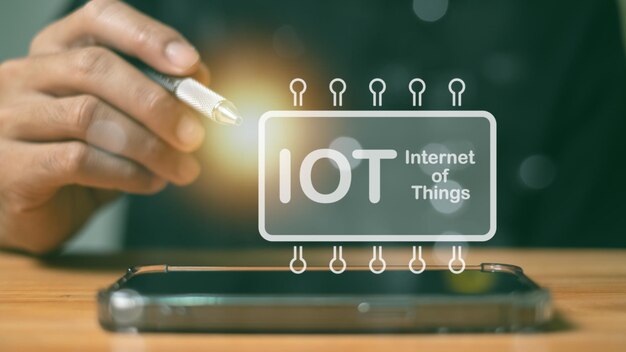The Top 10 IoT Platforms for Building Smart Devices and Applications

With the rapid advancement of technology, the Internet of Things (IoT) has become an integral part of our lives. From smart homes to connected cars, IoT has revolutionized the way we interact with everyday objects. If you're a developer or a tech enthusiast looking to build smart devices and applications, you'll need a reliable IoT platform to support your projects. Here are the top 10 IoT platforms for building smart devices and applications:
1. AWS IoT Core:
Amazon Web Services (AWS) IoT Core is one of the most comprehensive IoT platforms available. It offers scalable and secure cloud services, allowing you to connect, manage, and analyze your IoT devices effortlessly. With features like device provisioning, data processing, and device management, AWS IoT Core is a trusted platform for building robust solutions.
2. Microsoft Azure IoT Hub:
Azure IoT Hub by Microsoft is a fully managed service that enables secure and bidirectional communication between devices and the cloud. It provides features like device-to-cloud and cloud-to-device communication, device provisioning, and device management. With Azure IoT Hub, you can easily build IoT solutions on a global scale.
3. Google Cloud IoT Core:
Google Cloud IoT Core offers a reliable and scalable infrastructure for connecting, managing, and analyzing IoT devices. With robust security protocols and features like device management and real-time data analysis, Google Cloud IoT Core is a popular choice among developers.
4. IBM Watson IoT Platform:
IBM Watson IoT Platform provides a powerful set of tools for IoT application development. It offers device management, data analytics, and integration with AI capabilities, allowing you to build smart and intelligent solutions. IBM Watson IoT Platform also provides real-time insights and predictive analytics to optimize your IoT deployments.
5. ThingWorx:
ThingWorx, by PTC, is an industry-leading IoT platform that enables developers to rapidly build and deploy innovative IoT solutions. With features like device connectivity, data visualization, and remote monitoring, ThingWorx provides a comprehensive development environment for building smart devices and applications.
6. Cisco IoT Cloud Connect:
Cisco IoT Cloud Connect provides a secure and scalable platform for connecting and managing IoT devices. With features like device onboarding, data ingestion, and device management, Cisco IoT Cloud Connect simplifies the development and deployment of IoT solutions.
7. Siemens MindSphere:
Siemens MindSphere is an open IoT operating system that allows developers to connect their devices and collect data for advanced analytics. With its powerful APIs and development tools, MindSphere provides a flexible and scalable platform for building smart applications and services.
8. Bosch IoT Suite:
Bosch IoT Suite offers a range of cloud-based services and software tools for building and operating IoT solutions. With features like device management, data analysis, and machine learning capabilities, Bosch IoT Suite provides a comprehensive platform for building intelligent and connected applications.
9. SAP Leonardo IoT:
SAP Leonardo IoT is an end-to-end platform that combines IoT, Big Data, and AI capabilities to enable rapid innovation in the IoT space. With features like device connectivity, data intelligence, and real-time analytics, SAP Leonardo IoT empowers developers to build intelligent and predictive IoT solutions.
10. Oracle Internet of Things Cloud:
Oracle Internet of Things (IoT) Cloud provides a secure and scalable platform for connecting, analyzing, and managing IoT devices. With its robust features and integration capabilities, Oracle IoT Cloud enables developers to build innovative and intelligent IoT applications.
Choosing the Ideal IoT Platform: A Comprehensive Comparison

The Internet of Things (IoT) has revolutionized the way we connect and interact with the world around us. From smart homes to industrial automation, IoT technology has become an integral part of our daily lives. However, with so many IoT platforms available in the market, it can be challenging to choose the ideal one for your specific needs. In this article, we will provide a comprehensive comparison of different IoT platforms to help you make an informed decision.
1. Connectivity:
One of the critical factors to consider when choosing an IoT platform is connectivity. Look for a platform that supports various communication protocols such as Wi-Fi, Bluetooth, Zigbee, or cellular networks, depending on your application requirements. The platform should also offer seamless integration with existing IoT devices and sensors.
2. Security:
Security is of utmost importance when it comes to IoT devices. Ensure that the platform you choose offers robust security features such as encryption, authentication, and secure data transmission. Look for certifications like ISO 27001 or compliance with industry standards to ensure the highest level of protection for your data.
3. Scalability:
As your IoT deployment grows, scalability becomes crucial. The platform should provide the flexibility to scale up or down based on your changing needs. It should be capable of handling a large number of devices, data streams, and concurrent users without compromising on performance.
4. Analytics and Insights:
Choosing an IoT platform that offers advanced analytics and insights is essential for extracting valuable information from your data. Look for platforms that provide real-time data monitoring, predictive analytics, and customizable dashboards. These features will enable you to make data-driven decisions and optimize your operations.
5. Integration and Compatibility:
Consider the compatibility of the IoT platform with other systems and applications you are currently using. Look for platforms that offer easy integration with popular enterprise platforms like ERP, CRM, or data warehouses. This will enable seamless data flow and streamline your processes.
6. Developer-Friendly:
A developer-friendly platform with robust SDKs, APIs, and documentation can significantly accelerate the time-to-market for your IoT solutions. It should also support various programming languages and provide a developer community for support and knowledge sharing.
7. Cost and Pricing Model:
Evaluate the pricing models offered by different IoT platforms. Some platforms charge based on the number of devices, while others have a subscription-based model. Consider the upfront costs, ongoing maintenance fees, and any additional charges for support or consulting services.
8. Customer Support and Reliability:
Lastly, ensure that the IoT platform you choose offers reliable customer support. Look for platforms that provide 24/7 technical assistance, regular updates, and maintenance. Additionally, check customer reviews and ratings to gauge the platform's reputation and reliability.
Unlocking Efficiency: Exploring the Top 10 IoT Platforms

The Internet of Things (IoT) has revolutionized the way we live and work, connecting everyday objects to the Internet to make them smarter and more efficient. With the potential for billions of devices to be connected by 2025, IoT platforms have become essential tools for managing and optimizing these interconnected systems. Here, we explore the top 10 IoT platforms that can unlock efficiency in various industries.
1. AWS IoT Core: Amazon Web Services (AWS) provides a robust IoT platform that allows businesses to securely connect and manage their devices. With features like device shadowing and rules engine, AWS IoT Core enables real-time data processing and analytics.
2. Microsoft Azure IoT Hub: Azure IoT Hub offers a scalable and secure platform for connecting, monitoring, and managing IoT assets. It provides device-to-cloud and cloud-to-device messaging, as well as device management capabilities.
3. Google Cloud IoT: Google Cloud IoT helps businesses collect, analyze, and visualize data from their connected devices. It allows for easy integration with other Google Cloud services, enabling advanced analytics and machine learning capabilities.
4. IBM Watson IoT: IBM Watson IoT platform combines IoT data with cognitive computing to provide actionable insights. With features like device management and analytics, businesses can make informed decisions and optimize their operations.
5. Salesforce IoT Cloud: Salesforce IoT Cloud allows businesses to leverage IoT data to create personalized customer experiences. It enables organizations to connect IoT devices, analyze data, and trigger actions based on real-time information.
6. Cisco IoT Cloud Connect: Cisco's IoT Cloud Connect platform offers end-to-end connectivity for managing IoT devices, data, and applications. It provides robust security and analytics capabilities, allowing organizations to extract valuable insights from their IoT deployments.
7. Siemens MindSphere: Siemens MindSphere is an open IoT operating system that enables businesses to connect and monitor their assets. With advanced analytics and machine learning capabilities, it helps optimize operational efficiency and improve quality.
8. Oracle IoT Cloud: Oracle IoT Cloud offers a comprehensive platform for connecting, analyzing, and integrating IoT data into business applications. It provides real-time analytics and predictive insights for improving operational efficiency.
9. Bosch IoT Suite: Bosch IoT Suite allows businesses to connect, manage, and analyze their IoT devices and data. With its scalable architecture and industry-specific solutions, it helps optimize processes and increase productivity.
10. PTC ThingWorx: PTC ThingWorx is a leading industrial IoT platform that enables businesses to connect, analyze, and optimize their industrial assets. It offers features like remote monitoring, predictive maintenance, and digital twin capabilities.
These top 10 IoT platforms provide businesses with the tools and capabilities to unlock efficiency in various industries. Whether it's optimizing operations, improving customer experiences, or enhancing product quality, IoT platforms have become essential for businesses looking to leverage the power of connected devices. By implementing the right IoT platform, organizations can stay ahead of the curve and thrive in the increasingly connected world.